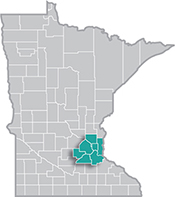 The Minneapolis-St. Paul metropolitan area is a national leader in finance, advanced manufacturing, agriculture and retailing.
The Minneapolis-St. Paul metropolitan area is a national leader in finance, advanced manufacturing, agriculture and retailing.
Medical devices, electronics and processed foods are strong suits recognized globally.
Want the freshest data delivered by email? Subscribe to our regional newsletters.
2/24/2021 9:00:00 AM
Tim O'Neill
It can be challenging entering the job market, advancing from one position to the next, transferring into a new industry, and finding the career that's just right for you. This is especially true today, as the labor market reels from the effects of COVID-19 and the resulting economic recession. To assist career seekers, high school and college graduates, certificate completers, and current students, the Department of Employment and Economic Development (DEED) and our partners in CareerForce have the resources and tools to help with that next step in your educational or career pathway.
For current students and those considering postsecondary education, DEED has several tools that reveal educational requirements for specific occupations, as well as typical outcomes for award levels and areas of study. For discovering what type of education is needed for specific occupations, one can turn to the Career Pathways tool, Occupations in Demand (OID) or the Career and Education Explorer. One look at current occupations in demand for the Metro Area, even during this current recession, displays the many educational pathways that students, graduates, and career-seekers can take. The OID tool also highlights that even without a bachelor's degree or advanced degree, there are occupations with high demand and high wages. Heavy and tractor trailer truck drivers, sales representatives, machinists, HVAC technicians, computer user support specialists, and electricians are just a sample of such occupations.
| High School or Equivalent | Postsecondary Non-Degree Award | Associate Degree | Bachelor's Degree or Higher |
|---|---|---|---|
| Home Health & Personal Care Aides ($28,922) | Licensed Practical & Licensed Vocational Nurses ($51,540) | Registered Nurses ($85,602) | Software Developers & Software Quality Assurance Analysts ($105,470) |
| Heavy & Tractor-Trailer Truck Drivers ($52,337) | Machinists ($54,777) | Computer Network Support Specialists ($65,304) | Market Research Analysts & Marketing Specialists ($74,094) |
| Landscaping & Groundskeeping Workers ($36,686) | Medical Assistants ($43,012) | Magnetic Resonance Imaging Technologists ($82,199) | Construction Managers ($96,646) |
| Customer Service Representatives ($41,374) | Heating, Air Conditioning, & Refrigeration Mechanics ($62,385) | Web Developers and Digital Interface Designers ($82,193) | Information Security Analysts ($103,978) |
| Sales Representatives, Wholesale & Mfg. ($73,225) | Computer User Support Specialists ($57,312) | Surgical Technologists ($62,542) | Substitute Teachers, Short-Term ($38,513) |
| First-Line Supervisors of Retail Sales Workers ($45,504) | Medical Dosimetrists & Medical Records Specialists ($53,709) | Clinical Laboratory Technologists and Technicians ($54,660) | Substance Abuse & Mental Health Counselors ($50,762) |
| Pharmacy Technicians ($40,284) | Automotive Service Technicians & Mechanics ($46,772) | Industrial Engineering Technologists and Technicians ($54,934) | Civil Engineers ($93,662) |
| Social & Human Service Assistants ($36,081) | Electricians ($76,713) | Radiologic Technologists & Technicians ($69,362) | Accountants & Auditors ($70,916) |
| Source: DEED Occupations in Demand (OID) | |||
For those seeking higher levels of postsecondary education, DEED's Graduate Employment Outcomes (GEO) tool can reveal typical employment and wage outcomes by educational award level and degree area. For example, recent two-year completers found the highest wages in areas such as Registered Nursing, Plumbing, Industrial Production Technologies, Precision Metal Working, and in HVAC Technology. Combining this type of data and knowledge with DEED's Occupations in Demand tool and the Career and Education Explorer can provide more clarity as individuals plan out their future.
Hand-in-hand with labor market information, career-seekers or those in transition can also get 1:1 help over the phone or attend virtual workshops through CareerForce to create and update their resumes, brush up on their interviewing skills, bolster their networking, and search for and apply forcurrent job openings.
Contact Tim O'Neill, Labor Market Analyst.